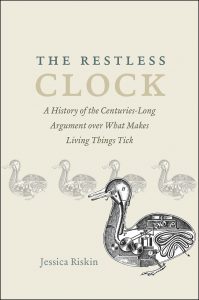The Difference It Makes: On Jessica Riskin’s The Restless Clock

From a recent review of Jessica Riskin’s The Restless Clock: A History of the Centuries-Long Argument over What Makes Living Things Tick, by George Scialabba at Inference:
According to the delightful science fiction romance film, Her, artificial intelligences also socialize, or will before long. I imagine them asking one another at parties, “Are you an agent?” They will not, of course, be asking about literary representation, but about the psychological or emotional or moral capacity we commonly call agency. They’ll be looking to find out whether the AI they’re meeting answers ultimately to itself or to someone else, whether it can set and change its own goals, whether it can surprise itself and others. Beings possessed of agency are autonomous, spontaneous, capable of initiative, and moved by internal as well as external forces or drives.
According to Jessica Riskin’s The Restless Clock, agency is everywhere, or at least far more widespread than is dreamt of in modern philosophy of science. If agency is “an intrinsic capacity to act in the world,” then science is not having any of it. It is “a founding principle of modern science … that a scientific explanation must not attribute will or agency to natural phenomena.” This ban on agency is the foundation of scientific epistemology; it “seems as close to the heart of what science is as any scientific rule or principle.”
Of course, scientists constantly write and speak as if natural phenomena had intentions: proteins regulate cell division; some cells harvest energy; genes dictate myriad biochemical activities. This language is just a convenience, a placeholder. As a biologist friend assures Riskin, “The more we get to know, the less the phenomena will seem purposeful.” Pressed, her friend laughs nervously and confesses, “OK, you’re right: it’s a matter of faith. And, as with any matter of faith, I am absolutely unwilling to consider the possibility that it could be wrong.”
On one side of this debate is a conception of nature as a brute or passive mechanism, lacking agency and susceptible to non-teleological explanations. The other, much less familiar tradition sees nature as an active mechanism, wholly material yet also “responsive, agitated, … restless, purposeful, sentient,” as “self-constituting and self-transforming machinery.” Ranging over Western (and occasionally non-Western) intellectual history, from Aristotle’s treatises on animals to current controversies in evolutionary theory and cognitive science, The Restless Clock undertakes, with astonishing energy and resourcefulness, to excavate this debate and expound its significance.
***
To read the review in full at Inference, click here.
To read more about The Restless Clock, click here.